More Post-Debate Democratic Poll Confusion
The post-debate polling of the Democratic race continues to be somewhat chaotic, but it's clear that Harris and Warren have made this a very different race than it was before the debates.
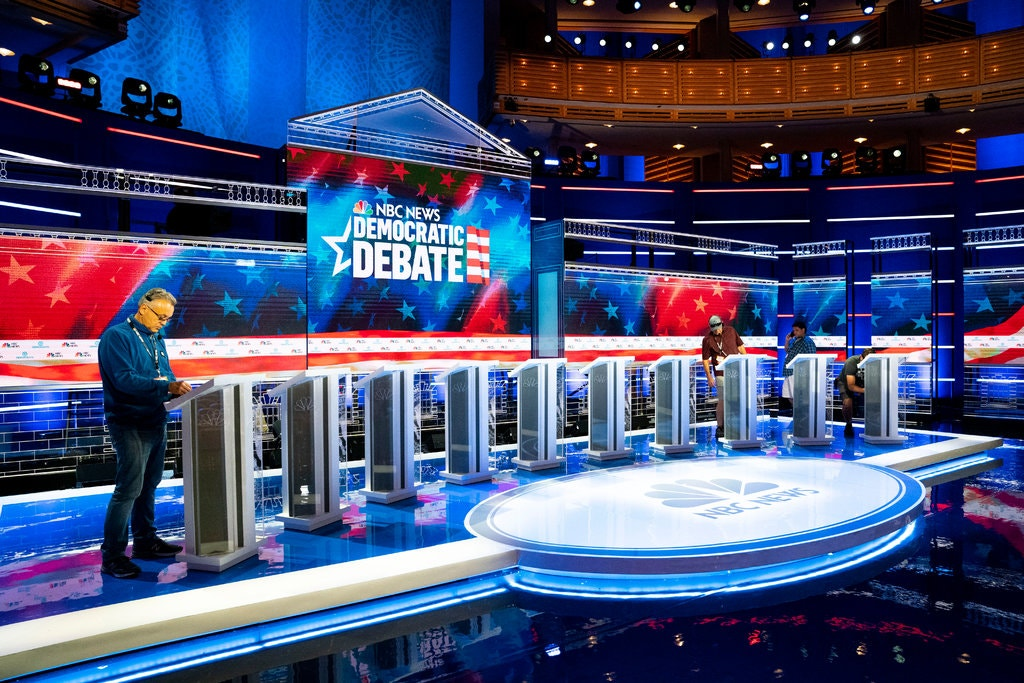
Two more post-debate polls show Elizabeth Warren and Kamala Harris gaining support, but the extent to which they are actually cutting into Vice-President Biden’s support is unclear and depends largely on which poll you’re looking at a particular period of time:
FIrst up, there’s a new poll from ABC News and The Washington Post that shows the Vice-President slipping a bit while Harris and Warren rise:
Former vice president Joe Biden leads his Democratic rivals in the campaign to win the party’s presidential nomination, continuing to show broad support despite coming under sharp attack from Sen. Kamala D. Harris (Calif.) and others in last week’s debate in Miami, according to a Washington Post-ABC News survey.
Democrats judge Harris as the standout performer among the 20 candidates who debated over two nights, but she ranks behind Biden and Sen. Bernie Sanders (I-Vt.) in preferences for a nominee to challenge President Trump in the 2020 general election.
Biden is the leader among Democrats in two separate measures, the first when those surveyed were asked to volunteer the name of a candidate they would support at this point as well as in a more traditional question that identifies the list of those running and asks respondents to select from among them. The former vice president’s position is buoyed by perceptions that he is the most electable Democrat in a general election and by his support among African American and older Democrats.
When asked to identify their preferred candidate, without being prompted with a list of names, Biden is cited by 21 percent of Democrats and Democratic-leaning independents, a gain of eight points since late April. Sanders runs second at 13 percent, up four points since April. Harris and Sen. Elizabeth Warren (Mass.) are tied at 7 percent, both up three points.
Among the others, only South Bend, Ind., Mayor Buttigieg, named by 3 percent, gets above 1 percent in this ranking. Meanwhile, 41 percent of Democrats did not volunteer a preferred candidate, down from 54 percent in April.
When presented with the names of 22 Democrats running for the nomination, Biden is slightly favored by 29 percent to Sanders’s 23 percent. Harris and Warren are again tied, at 11 percent. Buttigieg runs fifth, with 4 percent, and is tied with former housing secretary Julián Castro, who staked out a position calling for decriminalization of the border that framed the discussion of the immigration issue in both debates.
When second-choice preferences are added to first-choice selections, Biden remains atop the field, with 50 percent of Democrats saying he is either their first or second choice. Sanders stands at 40 percent in the combined ranking, followed by Warren at 25 percent and Harris at 24 percent.
The Post-ABC survey shows a clear stratification of the large Democratic field, based on a combination of first and second choices. In that grouping, four candidates — Biden, Sanders, Warren and Harris — are chosen by at least 20 percent as the first or second choice of Democrats and Democratic-leaning independents.
No other candidate tops 10 percent when combining first and second choices. Buttigieg comes closest, with a combined 9 percent. Thirteen candidates register at 2 percent or lower in the combined first and second choices.
The Post/ABC poll is different from several of the others that have been reported on in the past several days in that it asked respondents to pick a candidate in two different ways. The first is the traditional way that polling is done wherein the person taking the poll reads off the names of all the candidates, in random order, and asks the respondent who among that list they support or are leaning toward supporting. The second is a less traditional method that asks the respondent to name a candidate without hearing the list. (Presumably, this second question is asked before the first otherwise it would be pointless.) The poll also asked who a respondent’s second choice would be using the “read the list” method. The poll also differentiated its results between “All Adults” and “Registered Voters.” This is significant because former Vice-President Biden has a far bigger lead among Registered Voters than he does for adults as a whole. For this reason, there are understandably different results depending on which question you look at. You can see those different results at the link.
Contrasting with the Post/ABC poll, there is a new poll from The Economist and You Gov that shows a razor-thin lead for the former Vice-President
Former Vice President Joe Biden holds a slim 3 point lead against Sen. Elizabeth Warren (D-Mass.) in an Economist/YouGov Poll released Wednesday.
The new poll results follows Warren’s trend continuing to close in on Biden’s lead in the Democratic primary.
Twenty-one percent of voters said Biden is their first choice candidate in this week’s poll, which is a 3 point drop from his lead in an Economist/YouGov poll released last week.
An Economist/YouGov poll earlier this month found Biden held a 12 point lead in the race.
This week’s results could indicate a shift following the first round of debates. As seen in many other polls, Warren and Sen. Kamala Harris (D-Calif.) saw a surge in support.
This poll also asks the candidate preference question a number of different ways, as you can see in the raw poll report, and also differentiates its results between “All Adults” and “Registered Voters.” Looking at the registered voter numbers we find this:
- Joe Biden — 23%
- Elizabeth Warren — 19%
- Kamala Harris — 16%
- Bernie Sanders — 9%
- Pete Buttigieg — 8%
- Beto O’Rourke — 2%
- Cory Booker — 2%
- All other candidates under 2%
Obviously, we’ve seen a number of polls that are all over the place, and in some cases polls that disagree with themselves based on how the question is asked or whether they are talking to “all adults” or “registered voters.” That’s one reason why looking at individual poll numbers this far out is a rather pointless activity and why the polling averages and trends tell us much more than a single poll can.
On that note, we are now at the point where the RealClearPolitics Average largely consists of post-debate polling, and here’s where things stand:
- Joe Biden — 27.2%
- Bernie Sanders — 14.8%
- Kamala Harris — 14.7%
- Elizabeth Warren — 13.5%
- Pete Buttigieg — 5.3%
- Beto O’Rourke — 2.3%
- Cory Booker — 2.3%
- All other candidates at 2%
Basically, these numbers reflect the fact that Biden still leads the pack, but he is down significantly from where he was before the debate, as is Bernie Sanders, while Kamala Harris and Elizabeth Warren have moved quickly into a “Top Four” tier that virtually locks out all the other candidates. Pete Buttigieg, meanwhile, has fallen quickly to the point where he is a second tier of one candidate while Beto O’Rourke and Cory Booker are in danger of falling into irrelevance.
The trend since the debate can be seen most easily in the RCP chart:
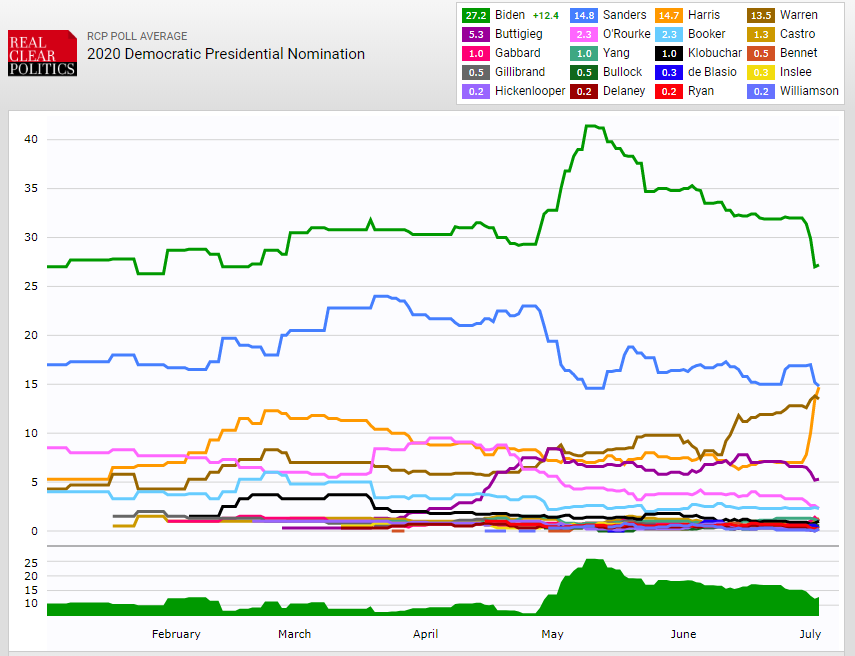
Obviously, this is after just a week of post-debate coverage during which Harris and Warren received a significant amount of positive coverage while Biden, Sanders, and O’Rourke received mostly negative reviews. It’s also a holiday week, meaning that the samples that these polls are getting could prove to be anomalous. That being said, if these numbers hold then we can definitely say that the race has changed significantly from where it was before the debate. That was to be expected, of course, and we can expect more changes to come in the future.

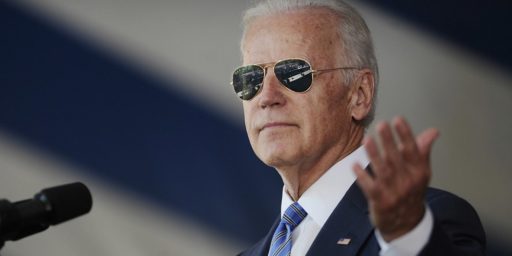
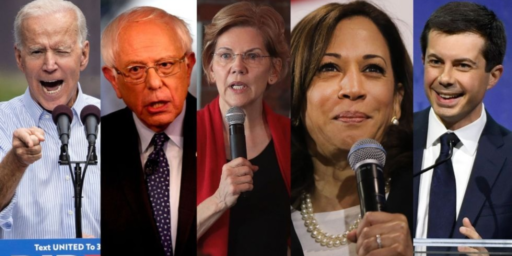
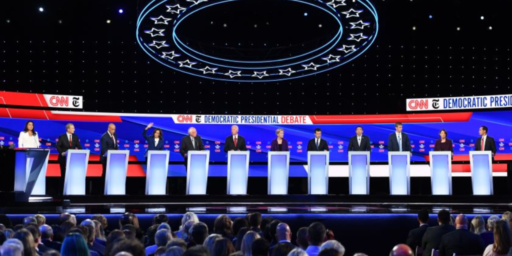
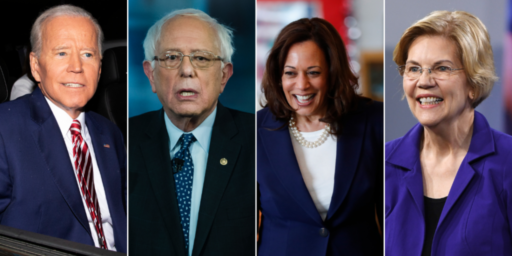
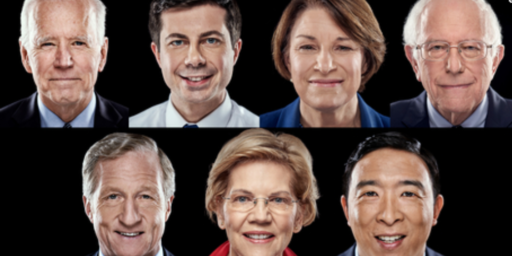
I think at the moment (very much subject to change) we have two competing forces. The Warren-Bernie voters who want large changes in how we run the country, and the Harris-Biden voters who are looking for a Trump-killer.
Warren is eating into Bernie because she has more complete plans and isn’t eternally angry and yelling. Kamala is eating into Biden’s support because she slapped Biden around which makes her look like the better Trump-killer.
Warren needs to convince voters she can handle Trump and Harris needs to convince voters she has actual ideas.
To me Harris is in the catbird seat – we know Warren’s plans are aspirational not likely to become law, and more Dems want a Trump-killer than care about M4A or free college. And she’s well-positioned if Biden takes it to get the Veep slot – the Veep candidate is supposed to be the attack dog and she’s shown she can do that. I’d rather be playing Harris’s hand than Biden’s or Warren’s.
@michael reynolds: I’d prefer either Warren or Harris to either Biden or Bernie.
All politicians plans are aspirational. Warren just has bigger aspirations.
Also, Biden would make a fine VP for either of them.He’s very Vice-Presidential, and I have great faith that he could take over if there was a tragedy.
Mayor Pete’s numbers are inconsistent across polls. At this point, I would hazard that anyone coming in consistently over 5% is plausible, and I wouldn’t worry too much. His initial jump was unsustainable, and some of the soft support is drifting, but he’s picked up some solid support.
The 2% crowd needs to rethink things, though, as something isn’t working. Maybe they need a new message, or they need to run for a Senate seat (perhaps their own). They have time to do both.
@michael reynolds:
The problem with that theory is that it isn’t backed up by the data. At least before last week’s debate, when voters have been asked about their second choice, the top second choice for Biden voters was Bernie, and vice versa. That suggests the polls are being heavily influenced by name ID rather than ideology or some theory on how best to defeat Trump.
Name ID also goes a long way in explaining the head-to-head matchups with Trump, which so far have shown Biden doing the best, Bernie slightly behind, and the rest somewhere behind either of them. Here are the average head-to-head matchups (per Wikipedia) with the top candidates in June:
Biden 48%, Trump 39%
Sanders 47%, Trump 39%
Harris 41%, Trump 40%
Warren 42%, Trump 40%
Buttigieg 39%, Trump 40%
Notice that Trump’s share of the vote is virtually the same for all the candidates–and indeed it’s fairly well in line with his approval ratings too. What varies is merely that Democrats whom voters are more familiarized with poll higher than other Democrats. Respondents aren’t choosing Trump more often when Kamala, etc. is the Democrat; rather, more aren’t making any choice, because Kamala et al are less well-known than Biden or Sanders.
These polls were taken after the debate, but before the fundraising numbers came out. Buttigieg outraised both Sanders and Biden. I wouldn’t write him off quite yet. If his support is still shaky and bouncing around after the next debate, then yes, he’ll be bumped down.
Since we’re still about 6 months from the first primary, the exact standing in the polls is less relevant than whether the candidate is able to garner around 10% support. Any candidate who isn’t able to break that is in danger of not making it to the Iowa caucuses, much less beyond to the primaries.
It’s so early in the process, even the people at 538 aren’t saying much about it. I don’t bother following polls until they begin to track them.
Is it any wonder that there is so much interest this early in the process? Look at who they are all trying to replace…